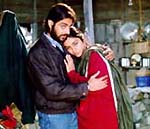Sudarshna Dwivedi
 It's a cross between an office room and bedroom - a table covered with books, writing pads, bric a brac, a packet of his favourite India Kings cigarettes juxtaposed with a big double bed with white sheets and pillow covers.
It's a cross between an office room and bedroom - a table covered with books, writing pads, bric a brac, a packet of his favourite India Kings cigarettes juxtaposed with a big double bed with white sheets and pillow covers.
White, in fact, is the leitmotif here, with dazzling white walls unadorned except for a large close-up of a young Gulzar and, on the opposite wall, another huge portrait this time of Meena Kumari in the full bloom of youth.
And not surprisingly, the man himself reflects the stark whiteness of the room - Gulzar, when he enters to greet us, is clad in crisp white kurta-pajamas, the golden mojris providing the only visual relief from this unalloyed whiteness.
 Maachis, his latest movie, is very much on his mind - understandably so, given the time lag between his last film and this latest venture which is now nearing release. Was this large gap in time deliberate, we ask. ''No,
it was merely a phase of unemployment," comes the smiling answer, "and this is not the first time it has happened. With the kind of films I make, this is a constant phenomenon - the inordinate gaps between my films are simply because it takes me that long to find a producer!"
Maachis, his latest movie, is very much on his mind - understandably so, given the time lag between his last film and this latest venture which is now nearing release. Was this large gap in time deliberate, we ask. ''No,
it was merely a phase of unemployment," comes the smiling answer, "and this is not the first time it has happened. With the kind of films I make, this is a constant phenomenon - the inordinate gaps between my films are simply because it takes me that long to find a producer!"
And from this fact - startling enough given his calibre as a director - flows the next, which is that he has gone with a star cast of virtual unknowns for his about to be released film. "First of all," he explains, "the subject is suitable for new faces, the presence of established stars will only dilute the reality I am trying to portray. Then again, the prices the established stars demand are prohibitive - at least for me. I can complete a whole films in the price being paid to the stars. And again, I wanted to get acquainted with this new generation, build a rapport with them.
 "I must add that I am happy I decided to go with an all-new star cast, Chandrachur (Singh, who plays the lead role) is a very sensitive boy. There is so much new talent out there, and they rarely get an outlet for their abilities. Raj Zutshi is another youngster I have used, who is full of raw potential."
"I must add that I am happy I decided to go with an all-new star cast, Chandrachur (Singh, who plays the lead role) is a very sensitive boy. There is so much new talent out there, and they rarely get an outlet for their abilities. Raj Zutshi is another youngster I have used, who is full of raw potential."
Gulzar, during his cinematic hibernation, has obviously done a lot of thinking about films in general, the state of the industry in particular. And now that the vein of thought has been tapped, the ideas flow thick and fast. "There are," he analyses, "very few films today that provide opportunities to talented actors to parade their ability - in general, the fast buck is the motto. Some make money from films, others go the Sukh Ram way - and either way, there is total deterioration all round.
"Mind you, I am an optimist, I believe that we are still growing - only, our growth is spiral, not vertical, which is why the rate of growth seems slow. Look at how we still, as a nation, have kept faith with democracy, despite our leaders. And compare this with the condition of some of our neighbouring nations. The point here is that our strength, as a nation, is and has always been the common man - hats off to him!"
It was perhaps inevitable that the "common man" motif would peep through at some stage in the conversation, for the 'common man' - as in the average middle class character - has anchored most of Gulzar's best films. And sure enough, Maachis appears to be cast in identical mould. "The thought I just mentioned has been expressed very beautifully by the Sutradhar (narrator, played by Om Puri) in Maachis," the film-maker says.
 And what is the film all about? "A human love story, set in the Punjab of turmoil and militancy," says Gulzar, who carries his 60 years lightly. "The love takes birth in that troubled state, and the scene then shifts to Himachal Pradesh where the major part of the film has been shot."
And what is the film all about? "A human love story, set in the Punjab of turmoil and militancy," says Gulzar, who carries his 60 years lightly. "The love takes birth in that troubled state, and the scene then shifts to Himachal Pradesh where the major part of the film has been shot."
This business of setting love stories against the background of turmoil seems to be the latest fad - 1942 - A Love Story did it against the backdrop of the Freedom Movement, Roja used Kashmir as backdrop, Bombay set the romance against the canvas of communal riots in the megapolis... Gulzar, though, denies any intention of playing me-too, arguing that his is a film that has been in the concept stage for years now, and if Maachis appears to be following in the footsteps of the others named above, it is only because it has taken him far longer than the likes of Vidhu Vinod Chopra and Mani Rathnam to find backers.
 Interestingly, Tabu - who after a rather awful start is now being seen as an actress thanks to her performance in films such as Saaza-e-Kalapani - is the heroine of Gulzar's latest. Which makes her the only recognisable star in the film. "She is very talented," says Gulzar, in explanation of his choice. "She seems wasted in the kind of roles she gets in Hindi films. And besides, she looks every inch a Punjabi in salwar-kameez outfits," smiles the director, oblivious perhaps of true-blue Punjabi girls such as Raveena Tandon, Twinkle Khanna and suchlike to chose from.
Interestingly, Tabu - who after a rather awful start is now being seen as an actress thanks to her performance in films such as Saaza-e-Kalapani - is the heroine of Gulzar's latest. Which makes her the only recognisable star in the film. "She is very talented," says Gulzar, in explanation of his choice. "She seems wasted in the kind of roles she gets in Hindi films. And besides, she looks every inch a Punjabi in salwar-kameez outfits," smiles the director, oblivious perhaps of true-blue Punjabi girls such as Raveena Tandon, Twinkle Khanna and suchlike to chose from.
One noticeable fact is that Gulzar goes into superlatives about anyone associated with Maachis - in his enthusiasm, there is perhaps a touch of relief at the fact that this film, unlike its predecessor Libaas, is destined to hit the marquee. "Libaas is about a husband and wife relationship, it has great performances by Naseeruddin Shah and Shabana Azmi," says he, about the film which is yet to secure commercial release. "How we admire the great works of fiction, and how when fictional circumstances become real we react differently, is what the film's underlying theme is."
And why is Libaas yet languishing in the cans? Is it indicative, we wonder aloud, of the perception that today, it is saleable stars and violence that sells on the marquee, and not good cinema? "Well," says Gulzar, ducking the question, "I had suggested that the film could be shown on Doordarshan, to ensure that at least that way, people get a chance to see it."
For now, Libaas is firmly put aside as Gulzar makes it clear that it is Maachis that is on his mind. Ask him for a more generalised comment on the state of films today, and again the director refuses to be drawn. "Films basically reflect the society it caters to, and unless society changes its character, neither will films," says the director. "If your politicians are corrupt, your underworld is thriving, your basic values are deteriorating, then this is what will be reflected in your films, and it is foolish to hope for something different."
And what of his own films? Which, we ask, are his favourites? And why?
''I like Ijaazat for its mood, the relationships between its characters. All three angles in the triangle are positive characters who care for each other's happiness, and through this film I brought out of the closet for the first time, on screen, the live-in relationship which has now become quite common.
''Kitaab is, for me, special because of its observation of the growing up of a child, of what children observe when they are growing up. The film is obviously subjective, when I myself was growing up what I observed was the high-handedness of grownups and this has been reflected in my film. Its like, they would gift me a costly pen, then keep it locked in the cupboard. This would make me fume, because no matter how beautiful the gift, it meant nothing unless I could use it."
''Then there was Namkeen - again, special for me because of the relationships it explores, and for its delicate screenplay. The film is about a relationship between two cousins - not an affair, but something much more delicate and sensitive. I think this is the best screenplay I have done.
''Lekin, for me, is special because of its element of mystery. Usually, when you make a mystery film, you provide a solution at the end. Lekin however doesn't - it just leaves you wondering."
From the past, to the future, and Gulzar is quick to admit that he has neither the inclination, nor the ability, to produce films on his own. "The business aspect of films does not fascinate him," he says. "I would like to concentrate on direction, and at some stage in the near future entrusting the mantle of direction to my daughter, Meghna. As of now, she is assisting Saeed Mirza, and has begun showing some interest in direction."
Apart from his art, children are what moves him the most, and Gulzar spends a lot of his spare time writing form them. "I guess," he laughs, "my IQ level is that of a child, so that might explain why I love children."
And when he looks back at his decades in the industry, what is the one word he would pick to describe his feelings? Joy? Contentment? Dissatisfaction? What?
"I am not content," Gulzar disclaims. "But I am not restless and unhappy, either. If you want one word, I guess it would be - comfortable."

